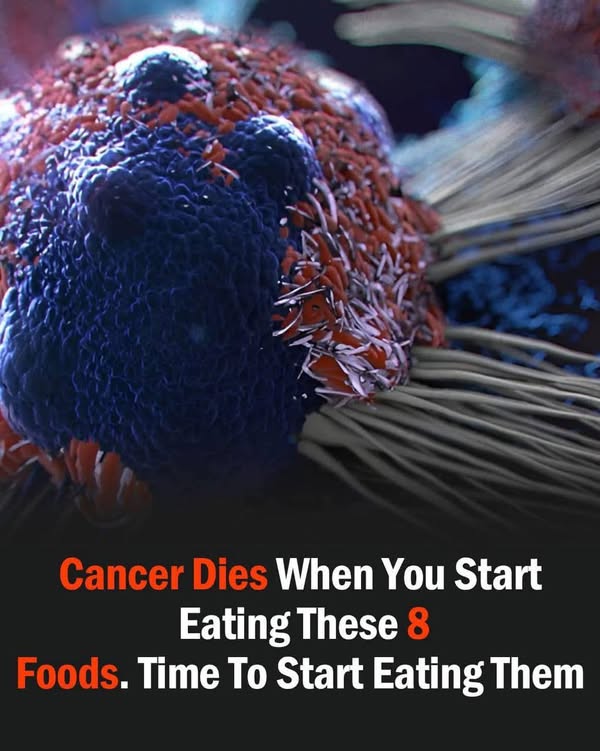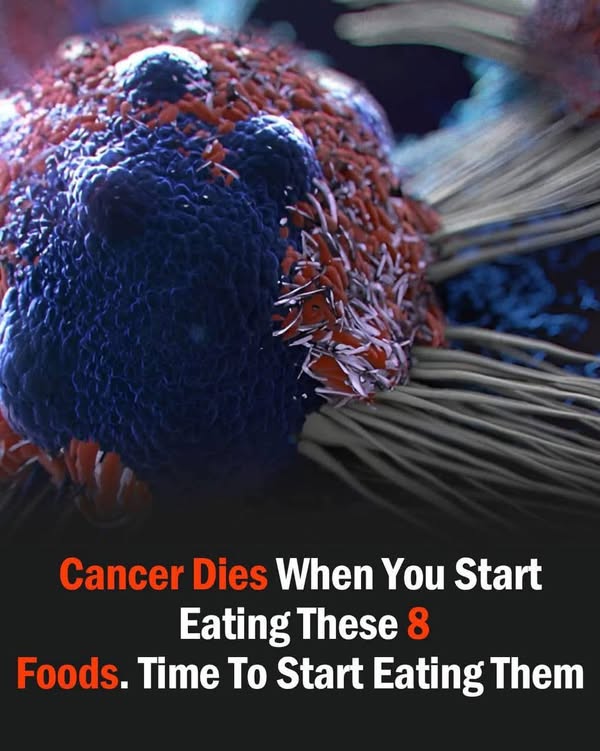Cancer is a devastating diagnosis that affects millions of people around the world. In the search for a cure, medical science has made significant strides, but the reality is that cancer is still one of the leading causes of death globally. While traditional treatments like chemotherapy, radiation, and surgery have saved countless lives, there is an increasing interest in the potential role that diet can play in preventing and fighting cancer.

The foods we eat have a powerful impact on our health. There is growing evidence to suggest that certain foods may possess natural cancer-fighting properties. While no single food can cure cancer, incorporating specific foods into your daily diet may help strengthen your immune system, reduce inflammation, and even slow down the growth of cancer cells.
Here are eight foods that are widely recognized for their potential cancer-fighting properties and why you should consider adding them to your diet starting today.
1. Berries: Nature’s Powerful Antioxidants
Berries, particularly blueberries, raspberries, strawberries, and blackberries, are rich in antioxidants, which are compounds that protect cells from damage caused by free radicals. Free radicals are unstable molecules that can lead to oxidative stress and inflammation, both of which are linked to the development and spread of cancer.
Research has shown that berries, especially blueberries, contain high levels of anthocyanins, a type of flavonoid that has been shown to have anti-cancer effects. These compounds not only protect against DNA damage but may also inhibit the growth of cancer cells. Studies suggest that berries may be particularly effective in preventing oral, breast, and colon cancers.
Eating a variety of berries regularly may help your body fight cancer at the cellular level. Add them to your smoothies, cereal, or enjoy them as a snack to boost your antioxidant intake.
2. Cruciferous Vegetables: The Cancer-Killing Powerhouses
Cruciferous vegetables, including broccoli, cauliflower, Brussels sprouts, kale, and cabbage, are some of the most well-researched cancer-fighting foods. These vegetables are rich in compounds known as glucosinolates, which are broken down into biologically active substances like sulforaphane when eaten. Sulforaphane has been shown to have powerful anti-cancer effects, including the ability to prevent the formation of cancerous cells and enhance the body’s detoxification processes.
In laboratory studies, sulforaphane has been found to inhibit the growth of several cancer cell types, including breast, prostate, and colon cancers. The high fiber content in cruciferous vegetables is another important factor, as it helps to support digestive health and maintain a healthy weight—both of which play a role in reducing cancer risk.
You can enjoy cruciferous vegetables in a variety of ways, from steaming and roasting to adding them to salads or stir-fries. Make sure to include them in your diet a few times a week to maximize their cancer-fighting benefits.
3. Garlic: A Natural Cancer Slayer
Garlic has been used for centuries as a medicinal herb, and its cancer-fighting properties are well documented. Garlic contains sulfur compounds, such as allicin, which have been shown to have potent anti-cancer effects. Allicin has been found to enhance the immune system’s ability to fight off cancer cells, slow the growth of tumors, and even reduce the spread of cancerous cells in the body.
Studies suggest that garlic may be particularly effective in preventing gastrointestinal cancers, including stomach and colorectal cancers. The active compounds in garlic also have anti-inflammatory properties, which may help reduce the risk of chronic inflammation, a known factor in the development of cancer.
To harness the full cancer-fighting benefits of garlic, try to consume it raw or lightly cooked. Add it to soups, salads, dressings, or use it as a flavoring for meats and vegetables.
4. Turmeric: The Golden Spice with Potent Anti-Cancer Properties
Turmeric, the golden-yellow spice that gives curry its distinct color, has become widely known for its anti-inflammatory and cancer-fighting properties. Curcumin, the active compound in turmeric, has been shown to inhibit the growth of cancer cells, reduce inflammation, and block the formation of new blood vessels that tumors need to grow. It also helps to detoxify the body and protect cells from DNA damage.
Numerous studies have demonstrated that curcumin may be effective in preventing or slowing down the growth of various types of cancer, including breast, lung, liver, and colorectal cancers. It also has the ability to sensitize cancer cells to chemotherapy, making treatments more effective.
To make the most of turmeric’s cancer-fighting properties, try adding it to your daily diet. Turmeric can be used in a variety of dishes, from curries and soups to smoothies and teas. For better absorption, pair turmeric with black pepper, which contains piperine—a compound that enhances curcumin’s bioavailability.
5. Green Tea: A Cancer-Fighting Beverage
Green tea has long been touted for its health benefits, and research supports its role in cancer prevention. Green tea is rich in polyphenols, particularly catechins, which have potent antioxidant and anti-inflammatory properties. One of the most well-known catechins in green tea is epigallocatechin gallate (EGCG), which has been shown to prevent the growth of cancer cells, reduce inflammation, and inhibit tumor formation.
Several studies have linked regular green tea consumption to a lower risk of developing various types of cancer, including breast, prostate, and liver cancers. The antioxidants in green tea also help protect the body’s cells from oxidative damage, which can lead to cancer over time.
To incorporate green tea into your daily routine, try drinking one or two cups a day. If you prefer a cold beverage, try iced green tea for a refreshing, cancer-fighting drink.
6. Tomatoes: A Rich Source of Lycopene
Tomatoes are rich in lycopene, a powerful antioxidant that has been linked to a reduced risk of several types of cancer, especially prostate cancer. Lycopene is a carotenoid that gives tomatoes their red color and has been shown to have potent anti-cancer properties. It works by neutralizing free radicals and reducing oxidative stress, which is a major contributor to cancer cell development.
Research has demonstrated that lycopene may slow the growth of cancer cells, prevent the spread of tumors, and even reduce the risk of recurrence in cancer survivors. Interestingly, cooking tomatoes actually increases the bioavailability of lycopene, making it easier for the body to absorb.
To maximize the cancer-fighting benefits of tomatoes, try incorporating them into your diet in various forms—whether it’s in salads, sauces, soups, or juices.
7. Leafy Greens: A Nutrient Powerhouse for Cancer Prevention
Leafy greens such as spinach, kale, Swiss chard, and collard greens are packed with essential nutrients like vitamins A, C, and K, as well as folate and fiber. These vegetables are also rich in chlorophyll, a natural compound that has been shown to help detoxify the body and prevent the buildup of carcinogenic substances.
Leafy greens are also high in antioxidants, which can help protect cells from damage and reduce the risk of cancer. Studies suggest that consuming leafy greens may lower the risk of lung, colorectal, and breast cancers. The high fiber content in these greens also supports digestive health, which is crucial for cancer prevention.
For a cancer-fighting boost, make leafy greens a regular part of your diet. Add them to salads, smoothies, soups, or stir-fries for a nutritious and delicious meal.
8. Nuts and Seeds: A Healthy Snack That Fights Cancer
Nuts and seeds, including almonds, walnuts, flaxseeds, chia seeds, and sunflower seeds, are rich in healthy fats, fiber, and antioxidants. Walnuts, in particular, contain polyphenolic compounds that have been shown to have anti-cancer effects, while flaxseeds are an excellent source of omega-3 fatty acids, which have been linked to reduced cancer risk.
Nuts and seeds also provide essential nutrients like vitamin E, magnesium, and selenium, all of which play important roles in cancer prevention. Studies suggest that consuming nuts regularly may lower the risk of several types of cancer, including breast, prostate, and colorectal cancers.
Incorporating a handful of nuts and seeds into your daily diet is an easy way to add cancer-fighting nutrients to your meals. Snack on them between meals, sprinkle them on your salads, or blend them into smoothies.
Conclusion: Start Eating These 8 Cancer-Fighting Foods Today
While no food alone can prevent or cure cancer, the research is clear: the right foods can support your body’s natural defenses and reduce your risk of developing cancer. By including these eight cancer-fighting foods—berries, cruciferous vegetables, garlic, turmeric, green tea, tomatoes, leafy greens, and nuts and seeds—into your daily diet, you can take a proactive approach to cancer prevention and promote overall health.
It’s time to make a commitment to your health and start incorporating these powerful foods into your meals. Every step you take toward a healthier diet can help reduce your cancer risk and empower your body to fight against disease.


